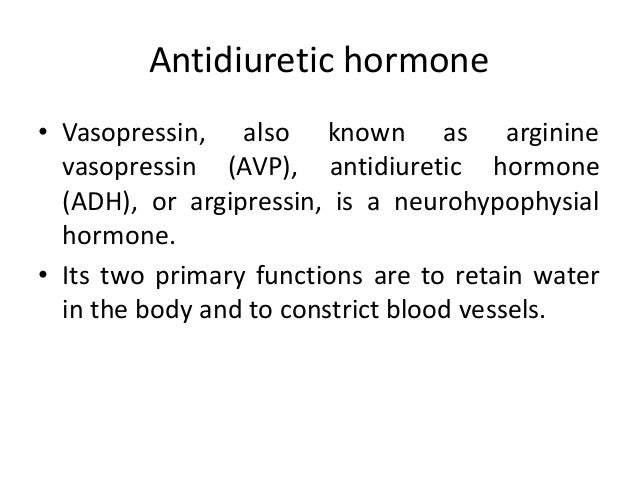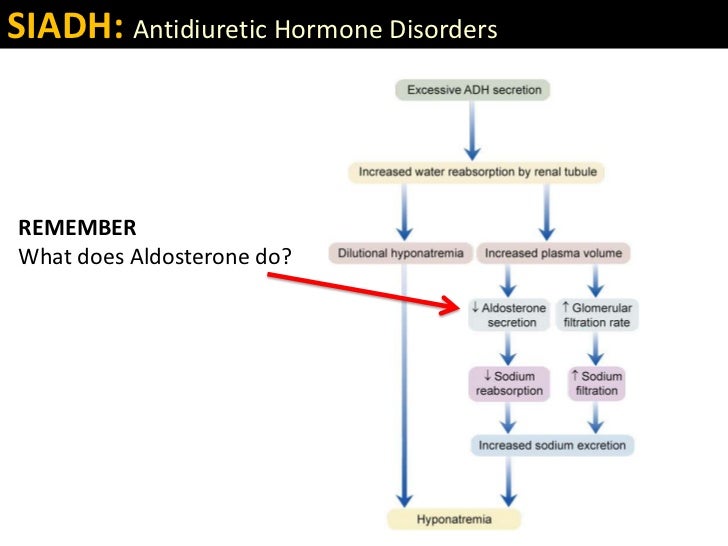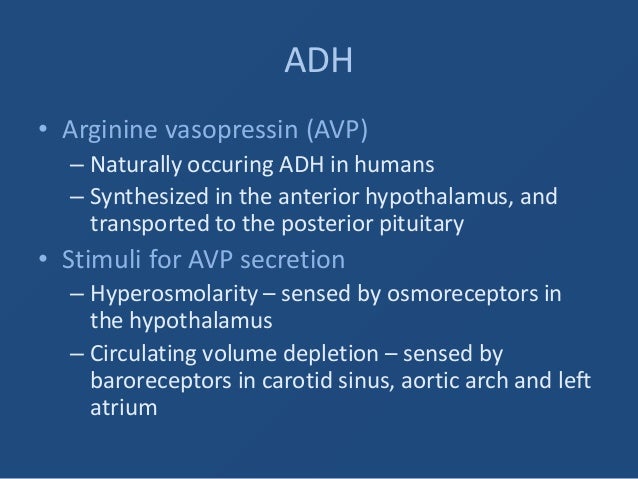Diabetes Insipidus Hormon Adh
Diabetesinsipidus and syndrome of inappropriate anti-diuretic hormone [siadh] have some similarities, but are two very different conditions. they both involve how the body create vasopressin [adh] and one of the primary symptoms of both conditions is excessive thirst, but the results are completely the opposite. in diabetes insipidus, the body is excreting too many Central diabetes insipidus. damage to the pituitary gland or hypothalamus from surgery, a tumor, a head injury or an illness can cause central diabetes insipidus by affecting the usual production, storage and release of adh. an inherited genetic disease can also cause this condition. nephrogenic diabetes insipidus. In diabetes insipidus, or di, the body releases too less anti-diuretic hormone (adh). it is a disorder of water and salt metabolism marked by extreme thirst and heavy urination. diabetes insipidus di takes place when the body is unable to regulate the fluids. the disorder is caused by a hormonal abnormality and is not related to diabetes. Diabetesinsipidus. in diabetesinsipidus, or di, the body releases too less anti-diuretic hormone (adh). it is a disorder of water and salt metabolism marked by extreme thirst and heavy urination. diabetes insipidus di takes place when the body is unable to regulate the fluids.

Diabetesinsipidus Ucla Pituitary Tumor Program
Diabetesinsipidus is caused by a lack of antidiuretic hormone (adh), also called vasopressin, which prevents dehydration, or the kidney's inability to respond to adh. adh enables the kidneys to retain water in the body. the hormone is produced in a region of the brain called the hypothalamus. A hormone called anti-diuretic hormone (adh), or vasopressin, helps control how fast or slow fluids are excreted. adh is made in a part of the brain called the hypothalamus and stored in the pituitary diabetes insipidus hormon adh gland, a small gland found in the base of the brain. if you have diabetes insipidus, your body can't properly balance fluid levels.
Treatment for most people with gestational diabetes insipidus is with the synthetic hormone desmopressin. primary polydipsia. there is no specific treatment for this form of diabetes insipidus, other than decreasing fluid intake. if the condition is related to a mental illness, treating the mental illness may relieve the diabetes insipidus. Antidiuretic hormone (adh, also sometimes called vasopressin) is released if you get dehydrated and the sodium level in the blood rises, which helps your kidneys retain water. how is di diagnosed? your doctor has several ways to check for di and to find the cause: analysis of urine samples. Diabetes insipidus and adh 1. adh only causes specific types of diabetes insipidus. the lack of adh in the body is usually caused by the 2. adh may be normal. for those who are diagnosed with nephrogenic diabetes insipidus, their adh levels may actually be 4. the focus of adh is in urine. The relationship between diabetes insipidus and adh is clear: when the anti-diuretic hormone isn’t communicating properly or isn’t being heard by a person’s kidneys, then this disease will cause excessive thirst and urination. for many people, regulating the amounts of adh that are within the body can reduce or eliminate the signs and.
Gyaninder p. singh, indu kapoor, in complications in neuroanesthesia, 2016. definition. diabetes insipidus (di) is a heterogeneous condition characterized by polyuria and polydipsia caused either due to a lack of secretion of vasopressin (antidiuretic hormone) from posterior pituitary, its physiological suppression following excessive water intake, kidney resistance to its action, or its. Nephrology nephrogenic diabetes insipidus (ndi) is a form of diabetes insipidus primarily due to pathology of the kidney. this is in contrast to central or neurogenic diabetes insipidus, which is caused by insufficient levels of antidiuretic hormone (adh, also called vasopressin). See more videos for diabetes insipidus hormone adh. Syndrome of inappropriate antidiuretic hormone (siadh): there is a high level of adh (antidiuretic hormone) produced. i like to remember this by the acronym siadh…. s increased adh (anti-diuretic hormone) high level of adh equals low urinary output. diabetes insipidus: there is a low level of adh (antidiuretic hormone) produced.

It is anti-diuretic hormone. this hormone is produced in the hypothalamus, and stored and eventually released in the posterior pituitary gland. in order to understand diabetes insipidus and siadh, you must understand how adh works because adh plays an important role in both di an siadh. lecture on siadh and di. Central di, the most common form of diabetes insipidus, is caused by insufficient levels of circulating antidiuretic hormone ; nephrogenic di, however, is characterized by defective renal adh receptors in the kidneys.
Diabetesinsipidus, also called di, is a rare diabetes insipidus hormon adh condition that leads to frequent urination (passing a lot of clear, urine) and excessive thirst. health tools for patients and caregivers, provided by the endocrine society. More diabetes insipidus hormone adh images.

Diabetesinsipidus Wikipedia
Diabetes insipidus and adh diabetesinsipidus. org.
Diabetes insipidus is a rare condition in which there is a diabetes insipidus hormon adh problem with the secretion of antidiuretic hormone (adh). adh, also called vasopressin, controls the amount of water the kidneys release in the urine. adh is stored in the pituitary gland, which is located behind the bridge of the nose. Diabetesinsipidus (di) is a condition characterized by large amounts of dilute urine and increased thirst. the amount of urine produced can be nearly 20 liters per day. reduction of fluid has little effect on the concentration of the urine. complications may include dehydration or seizures.. there are four types of di, each with a different set of causes. Diabetes insipidus is caused by a lack of antidiuretic hormone (adh), also called vasopressin, which prevents dehydration, or the kidney's inability to respond to adh. adh enables the kidneys to retain water in the body. the hormone is produced in a region of the brain called the hypothalamus.
Diabetes insipidus (di) is a condition characterized by large amounts of dilute urine and increased thirst. the amount of urine produced can be nearly 20 liters per day. reduction of fluid has little effect on the concentration of the urine. complications may include dehydration or seizures. Alternative names for diabetes insipidus. water diabetes; di. what is diabetes insipidus? anti-diuretic hormone (also called vasopressin) is produced in the hypothalamus and then secreted by the pituitary gland into the bloodstream at the base of the brain. anti-diuretic hormone is needed to control the fluid balance in the body. it does this by making the kidneys produce more concentrated urine. Diabetesinsipidus is caused by problems with a chemical called vasopressin (avp), which is also known as antidiuretic hormone (adh). avp is produced by the hypothalamus and stored in the pituitary gland until needed. What is diabetes insipidus? diabetes insipidus is a rare condition in which there is a problem with the secretion of antidiuretic hormone (adh). adh, also called vasopressin, controls the amount of water the kidneys release in the urine. adh is stored in the pituitary gland, which is located behind the bridge of the nose.
Antidiuretic hormone (adh), also known as vasopressin, is a small peptide hormone which regulates the body’s retention of water. it is one of only two hormones secreted by the posterior pituitary gland. in this article, we will discuss the synthesis, storage, release and action of adh, and consider its clinical relevance. Nephrogenic diabetes insipidus (ndi) is a form of diabetes insipidus primarily due to pathology of the kidney. this is in contrast to central or neurogenic diabetes insipidus, which is caused by insufficient levels of antidiuretic hormone (adh, also called vasopressin). nephrogenic diabetes insipidus is caused by an improper response of the kidney to adh, leading to a decrease in the ability of. Diabetesinsipidus (di) is an abnormal condition characterized by the inability of the kidneys to conserve water. this leads to diabetes insipidus hormon adh excessive thirst and a high volume of urine. the most common cause is the lack of a pituitary hormone called antidiuretic hormone (adh). in less common cases, adh is present, but the kidneys do not respond to it.
Nephrogenic Diabetes Insipidus Wikipedia
Diabetes insipidus endocrine society hormone.

When it comes to diabetes insipidus, the body is unable to maintain this important balance. the excretion function of the kidneys is determined in great part by the production of an antidiuretic hormone. the production of this hormone–vasopressin (adh)–takes place in the hypothalamus. subsequently, the hormone is stored in the hypophysis. Antidiuretic hormone (adh) is a hormone that helps your kidneys manage the amount of water in your body. nephrogenic diabetes insipidus is not related to the more common diabetes mellitus.
Comments
Post a Comment